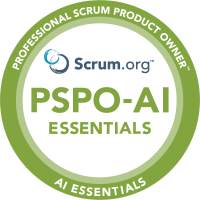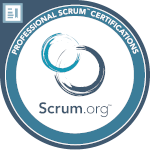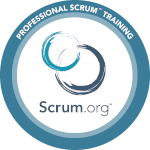Welcome to the Home of Scrum!™
Helping people and teams use Professional Scrum to solve complex problems through training, certification, consulting and ongoing learning experiences
New interactive, hands-on training course designed to empower Product Owners, Product Managers, Business Analysts to understand, leverage, and apply Artificial Intelligence (AI) to support their job and teams.
Case Studies
What Makes Us Different?
Yes, we really are the Home of Scrum! Scrum co-creator Ken Schwaber founded Scrum.org in 2009 to be a different kind of organization with people dedicated to a mission of helping people and teams solve complex problems. This mission drives everything we do. We've seen individuals and organizations use the power of Scrum to transform the way they work and deliver value. We want to help others enjoy the same success.
As a mission-based organization focused on helping people and teams, we provide many different ways to learn about Scrum and a community to help people learn
Go beyond the mechanical aspects of Scrum and transform your mindset and focus while embracing the Scrum Values
Continuously learn both in and out of the classroom with different types of learning that range from activity-based training to self-learning at your own pace
Learn from over 350 highly experienced Scrum practitioners who all bring their real-life experiences to the classroom
Get hands-on, interactive, globally consistent training in all classes and opportunities to further grow your knowledge
Prove your knowledge and get certified with industry respected certification tests that do not require renewal
Professional Scrum Training
When it comes to training, are you looking for more than standard corporate training with a trainer simply presenting to the class? Scrum.org training courses embody the principles of Professional Scrum while providing an interactive learning experience. Learners continuously tell us how much they love our courses! Professional Scrum Trainers build our courses together, while bringing their own experiences to the classes they teach. They all use the same teaching materials ensuring consistent learning among your team members. Scrum.org provides a variety of courses including the Scrum fundamentals, role-based learning, and courses that go beyond the framework with training about complementary practices.
Professional Scrum Certifications
You may think that you can just go to the class and automatically get certified. You may also think that you must take a class to get certified. Both of these assumptions are actually incorrect. There is value in validating the knowledge you gain in the class, and we also understand that some people prefer to self-learn and leverage their experience. Our certifications prove what you know, while our classes teach you. It is recommended to take a class, but not required. Professional Scrum certifications are designed for a variety of experience levels. They are globally recognized and respected because they test a true understanding of Scrum and how to apply it. There are no renewals required on our certifications. Once you earn it, you keep it!
Resources
If you are looking to learn beyond the classroom, we have a variety of resources you can explore and use. Continue expanding your knowledge with blogs, videos, webcasts, case studies, whitepapers, and more.
Stay Connected!
As human beings, we often learn a lot from the experiences of others. There are a variety of ways to learn from other Professional Scrum practitioners including a forum, events, meetups, blogs, podcasts, and more.
What Our Students Say
Heard enough from us? Learn from our students! We collect reviews through a third party, Trustpilot, and also survey students 6 months after they take a class to check in on the value they gained and learnings they applied.
Have Questions?
We are here to help you! Take a look in our Frequently Asked Questions section.
You can also contact support below or email us directly at support@scrum.org.














































 Alex Brown
Alex Brown
 Uta Kapp
Uta Kapp
 Steven Deneir
Steven Deneir
 Piyush Rahate
Piyush Rahate